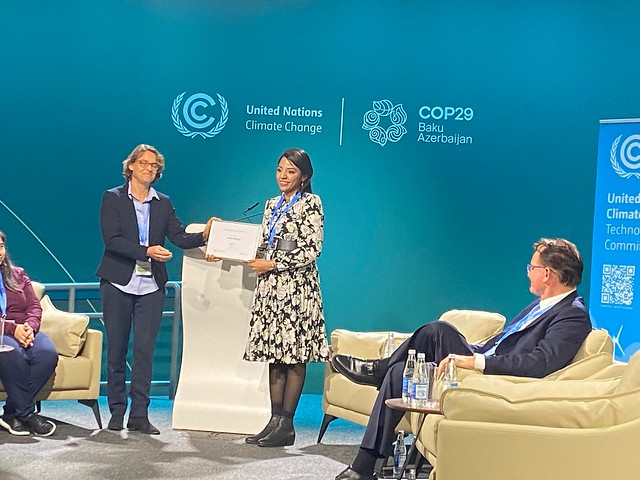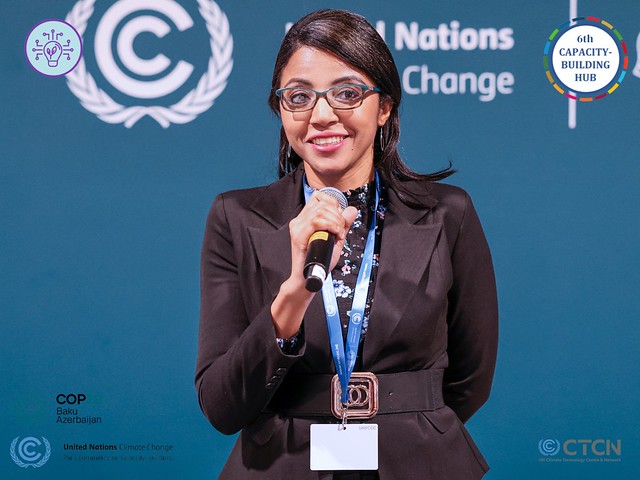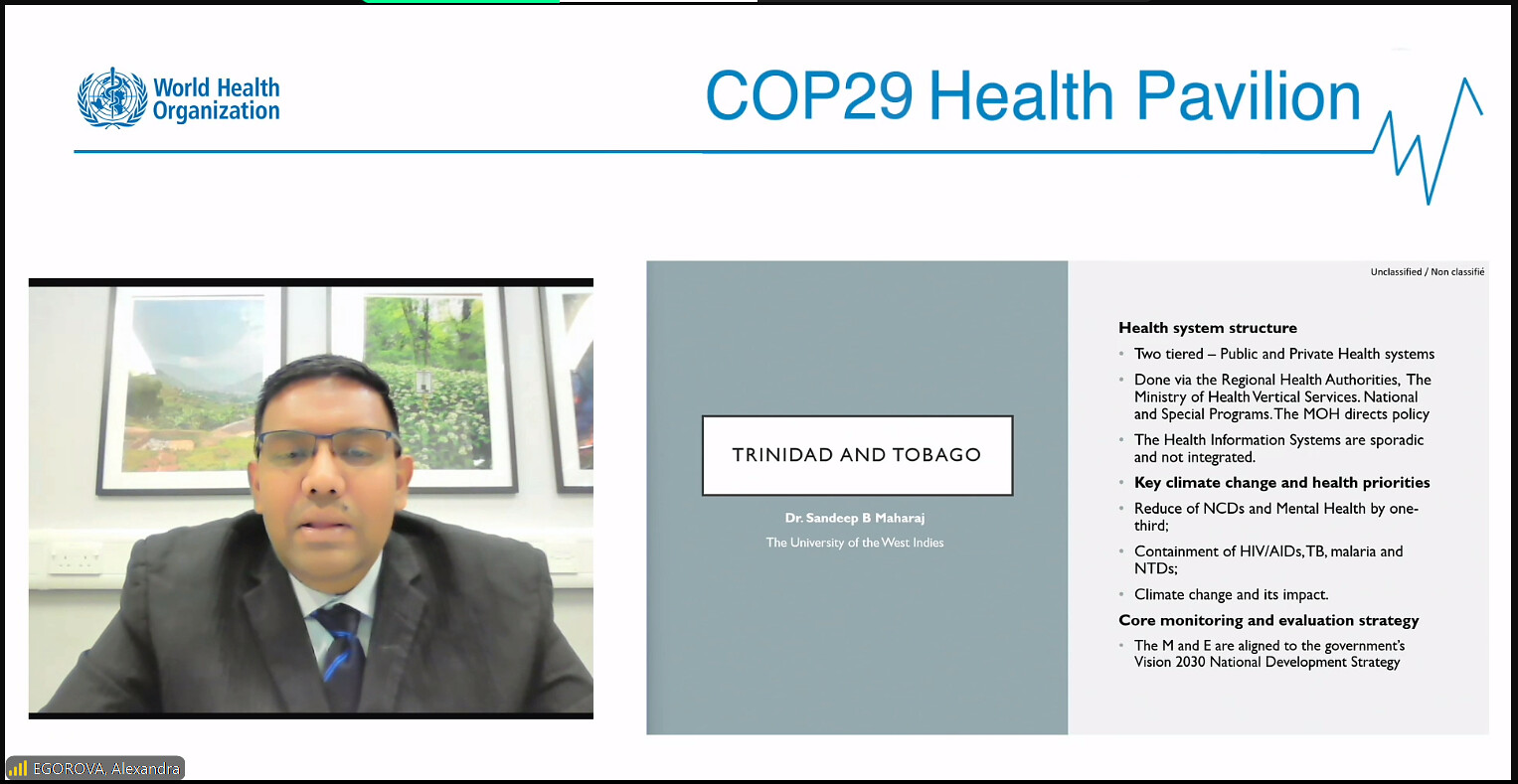The UWI Regional Headquarters, Jamaica. Friday December 6, 2024—Dr. Letetia Addison, a seasoned researcher and Adjunct Lecturer at the School of Science, Computing and Artificial Intelligence, The University of the West Indies (The UWI) Five Islands Campus, was announced as the Grand Prize winner of the 2024 AI Innovation Grand Challenge at the recently concluded COP29 in Baku, Azerbaijan. Her proposal, AI4SIDS, an AI-powered platform enhancing climate resilience in Small Island Developing States (SIDS), stood out among the 114 entries received from 62 countries.
AI4SIDS autonomously collects and processes real-time data from Internet of Things (IoT) devices, social media, and weather reports using GPT-4 and Whisper. It delivers multi-channel alerts (via mobile, TV, radio, and SMS), provides localised educational resources in local languages to help communities prepare for disasters, and uses predictive analytics and automated feedback loops to optimise disaster responses with minimal human intervention.
Dr. Addison discussed using AI to combat climate change in vulnerable areas during the AI Session at the annual climate conference. Her presentation was part of the Technology Mechanism Initiative on AI for Climate Action. It focused on using AI technologies to support climate solutions in developing countries, especially in the least developed countries (LDCs) and small island developing states (SIDS).
"As a proud UWI researcher at COP29, it was a privilege and honour to represent my team and the Caribbean region, showcasing our talent in advancing solutions that not only safeguard our islands but also inspire hope for a sustainable future in vulnerable communities worldwide", Dr. Addison said. "We eagerly look forward to collaborations that enhance traditional early warning systems with data-driven innovations, embodying our collective resilience and ingenuity in tackling climate challenges."
Dr. Sandeep B Maharaj, Director of The UWI School of Pharmacy, and Dr La Daana Kanhai, Lecturer in the Department of Life Sciences from the St. Augustine Campus, also shared expert insights at the annual UN Climate Change Conference. Dr. La Daana Kanhai participated in the Virtual Ocean Pavilion, which was themed 'Towards greater engagement of regional research, academic, environmental, and economic institutions in addressing climate change challenges.'
Dr. Maharaj hosted a side event that showcased youth-led action on mental health and climate change. It highlighted the recently concluded Connecting Climate Minds project, for which The UWI was the Latin America and Caribbean Centre. He also presented on Trinidad and Tobago's health structure, climate change, health priorities, and monitoring and evaluation systems at the COP29 Pavillion on the topic 'Measuring the Climate Resiliency of Health Systems: Challenges and Opportunities' hosted by Health Canada.
Members of the Management Committee of The UWI Global Institute for Climate-Smart and Resilient Development (GICSRD) who also attended COP29 shared their concerns regarding the outcomes of the conference, particularly about Climate Finance, which was a key focus of the discussions. They underscored several important issues for consideration.
Dr. John Charlery, Executive Director of GICSRD, reflected on the pledge made by developed countries to channel US $300 billion per year to developing nations by 2035. He stated, "The agreement has supported less than one-quarter of what is required. It is probably too early to determine exactly how this low level of financial support will impact the mitigation and adaptation activities within the Caribbean region. Still, it is obvious that the ability to engage in sustainable development programmes will be very adversely impacted."
Other committee members echoed Dr. Charlery's concerns. Dr. David Smith, Coordinator of the Institute for Sustainable Development, remarked, "Climate proofing has to be done by incurring debt…" affecting the ability of SIDS to attain the SDGs. Adding his perspective, Dr. Abuenameh Aiyejina, of the Five Islands Campus said, "While the increase of climate financing from US$100 billion to US$300 billion is an improvement, it is still far from enough for the needs of small island developing states." Dr. Patrick McConney of the Cave Hill Campus lamented the "lack of real progress' at COP29, dubbing the major outcomes "deeply disappointing."
Regarding shunting COP28's decision to transition from fossil fuels to COP30, Dr. Charlery suggested it needed to reflect more urgency in addressing the issues. He concluded, "…with the global mean temperature in 2024 reaching 1.5oC over that of the pre-industrial era, half a decade earlier than the projected climate models simulations, climate financing to address the Caribbean issues will become more challenging within a climate system that is probably changing faster than previously expected."
Dr Letetia Addison’s Proposal Video

Ms. Sophie de Coninck, Director, Means of Implementation, UNFCCC presents Dr. Letetia Addison (right) with the Certificate of Award for the AI Innovation Challenge 2024 at COP29, hosted by the UNFCCC Technology Executive Committee (TEC) and Enterprise Neurosystem

Dr. Letetia Addison, winner of the AI Innovation Challenge 2024, shares insights on the transformative potential of AI in SIDS at the Climate Innovation Day at COP29

Dr. Sandeep B Maharaj, Director of The UWI School of Pharmacy, UWI St. Augustine presents on Trinidad and Tobago's health structure, climate change, health priorities, and monitoring and evaluation systems at COP 29’s Health Pavillion






